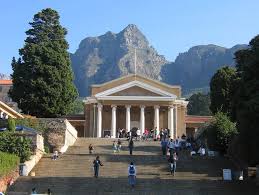
EXACTLY how far is the University of Cape Town (UCT) prepared to go in genuflecting to populist thugs in the name of racial nationalism? Further and further, it seems, from the latest assault on academic freedom within the institution; this time from the university’s executive itself.
Last month the South African Journal of Science, one of the nation’s premier academic publications, printed an article by respected economist Nicoli Nattrass entitled ‘Why are black South African students less likely to consider studying biological sciences?’ It’s a perfectly valid research question and her methodology and findings were clearly acceptable to the journal’s editors. No doubt if her work has defects colleagues will be very quick to point them out: that’s the way academic discourse works, often quite harshly. So far, and so good.
But this innocuous sounding piece of work has been denounced by the executive of UCT, which has ‘distanced itself’ and promised further investigation. It’s an extraordinary step that would be unbelievable were we not all-too familiar with the political environment of contemporary South Africa. It’s an outrage on three grounds. First, executives administer universities; they do not pronounce on academic work. This in itself is a double bind, infringement of the very academic freedom they are supposed to uphold. That’s worth repeating: a university executive has attacked the concept of academic freedom. (As a rhetorical aside has the Registrar, guardian of the university’s legal and moral obligations, gone AWOL?)
Second, this executive has clearly never bothered to read chapter two of our Constitution. It’s called the Bill of Rights and a clause in it protects ‘academic freedom and freedom of scientific research’. Third, the UCT executive’s reckless and subservient grandstanding attracted the attention of South Africa’s notorious purveyor of fake news (Cato Manor hit squads, SARS rogue units, and other unicorns), the Sunday Times, which named Nattrass ‘Mampara of the Week’ in the finest tradition of cheap journalism. This will have set her up for the torrent of abuse that passes for public debate in this age of Twitter. UCT has added to a recent history of craven behaviour by betraying one of its own staff in her pursuit of knowledge. It could get worse if it is shown there is any substance to a suggestion that the university tried to stop the article before publication.
All of this is quite an achievement by UCT and it comes as no surprise to learn that pressure to behave in this fashion has come from the Black Academic Caucus. It has trotted out its standard litany about white supremacy and received black pain. Nattrass has reportedly summed it up succinctly and accurately herself: ‘manufacturing and mobilising outrage’. Such has become commonplace.
This is not just the meltdown of a university that once claimed to be the best in South Africa. It comes at a significant time when the ANC, casting around for a political lifebelt in amid its multiple failures, is employing increasing doses of centralism using the excuse of the Covid-19 public health crisis. The command centres and war rooms are not going to disappear with the virus. They will become a permanent part of the government landscape, exactly the scenario for which the ANC in its Stalinist impatience with freedoms and liberties has been longing.
Just over ten years ago the University of KwaZulu-Natal went through a series of internal contortions that centred on academic autonomy and freedom. It proved a worthwhile but rearguard action and those of us involved hoped that it would serve as a red flag for other higher education institutions in future. This makes recent events at UCT culminating in this attack on academic freedom all the more disappointing.
Does the UCT executive comprehend what it has done? Whether it does, or does not, it should resign en bloc and find jobs better suited to kowtow culture. When are South African academics going to speak up – individually or collectively? The extent to which they do this will be a clear measure of how far toxicity has seeped into academia and how close academic freedom is to oblivion. And the attention of the international academic community needs to be drawn to the fact that South Africa is slipping back to a culture of subservience last seen at the height of apartheid.
NOTE: The UKZN saga is recounted in the The Search for the Soul of a South African University by Nithaya Chetty and Christopher Merrett available at https://www.natalia.org.za/Other_books/SSSAU.html